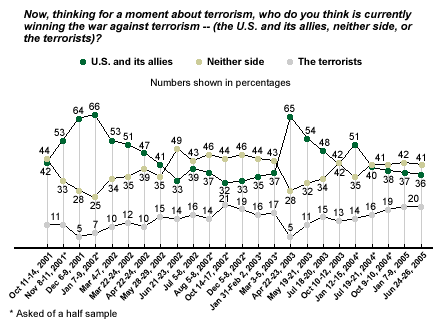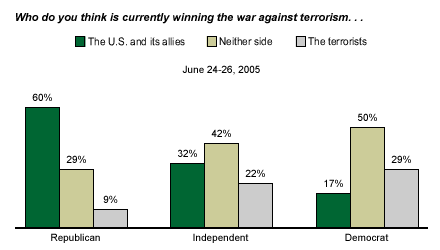Bad news is coming in proverbial threes for the Bush administration -- at least according to Gallup's June 24-26 poll results*. Not only did the poll reveal increasing public frustration with the war in Iraq and flagging presidential job approval ratings, but it also showed the public is not too confident that the United States and its allies are winning the war against terrorism.
About a third of Americans think the United States is winning the war on terror, while 20% say the terrorists are winning; 41% say neither side is winning. This is the second consecutive survey in which 20% of respondents say the terrorists are winning, just shy of the high point on this response since Gallup began asking the question in October 2001.

From November 2001 through December 2002, with the U.S. military experiencing success in its operations in Afghanistan, public sentiment was squarely on the side of the United States and its allies, with majorities of Americans saying they were winning the war on terror. As conditions changed in the subsequent months, opinions on the topic grew less favorable for the United States. By October 2002, just days after a massive terrorist bombing in Bali, Indonesia, that killed more than 200 people, perceptions of the war on terror sunk to an all-time low -- just 32% of Americans thought the United States was winning the war on terror. The percentage saying the United States was winning spiked in spring 2003 after the invasion of Iraq, and in early 2004 after the capture of Saddam Hussein -- but a steady decline followed each surge. The most recent souring of public sentiment on the war on terrorism, which likely stems from the continuing attacks by Iraqi insurgents and al-Qaeda terrorists in Iraq, rivals the results from 2002.
Optimism Highest Among Republicans, Younger Americans
Republicans are far more optimistic than independents or Democrats about the status of the war on terrorism. A majority of Republicans (60%) believe the United States and its allies are winning, while 29% say neither side is winning, and just 9% say the terrorists are winning. Among independents, opinion is more evenly balanced -- a third think the United States is winning the war, while 42% think neither side is winning, and 22% think the terrorists are winning. Among Democrats, just 17% think the United States is winning the war on terror, half think neither side is winning, and 29% think the terrorists are winning.

The youngest American adults are the most optimistic when it comes to the war on terror. Nearly half of 18- to 29-year-olds (47%) think the United States is winning. That percentage drops to roughly a third among all other age groups.
*These results are based on telephone interviews with a randomly selected national sample of 1,009 adults, aged 18 and older, conducted June 24-26, 2005. For results based on this sample, one can say with 95% confidence that the maximum error attributable to sampling and other random effects is ±3 percentage points. In addition to sampling error, question wording and practical difficulties in conducting surveys can introduce error or bias into the findings of public opinion polls.
